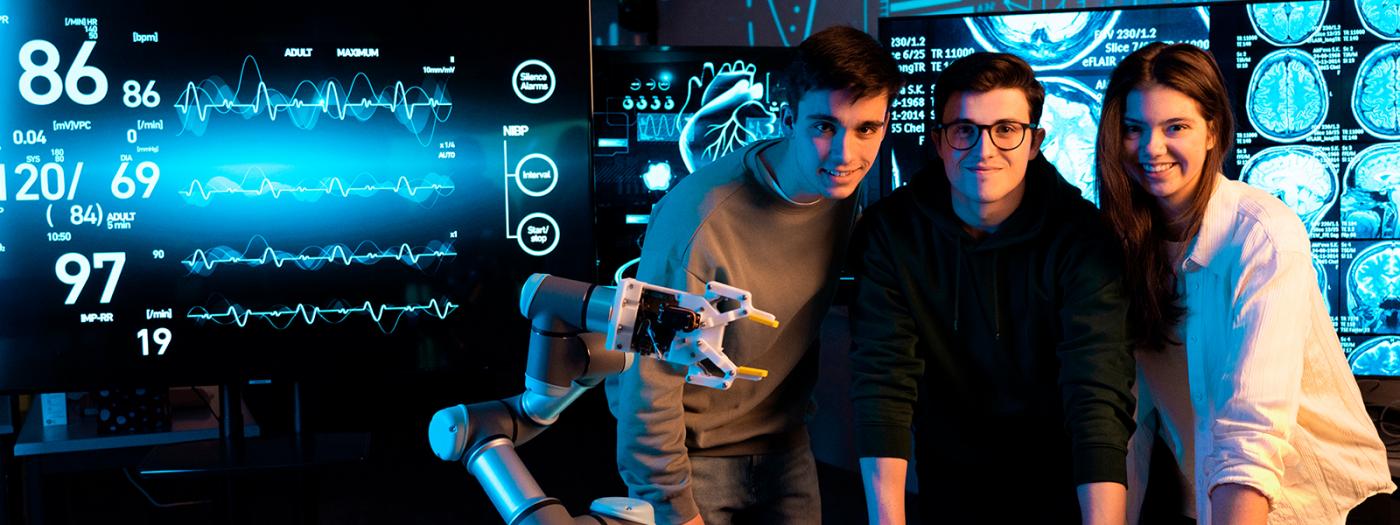Titular Professors
No previous knowledge is required.
1. To know and use appropriate terminology related to patient experience
2. To apply appropriate techniques and tools related to patient experience to different challenges related to the person being cared for and their interaction with health services.
3. To integrate and share learning clearly, both in oral and written expression, after analysing and summarising information and evidence of the patient experience.
1. Background: user experience, customer centricity, and patient experience
2. Patient-centred care and the evolution of patient experience
3. Basic principles and elements that influence patient experience, the patient journey
4. Patient experience management, dimensions, tools and methodologies to investigate, evaluate and manage patient experience (HCD, design thinking, evidence-based design, co-design, qualitative research, PREMS, NPS, etc.)
5. Humanisation of care, patient participation in decision-making, and collaboration
6. The culture of the organisation and comprehensive management of patient experience
7. Current and future challenges of patient experience
The Patient Experience course is taught by combining different teaching methodologies, from the master class to transmit the fundamental theoretical concepts of the course, to practical sessions where challenges related to patient experience are raised.
The course will be based on real-world professional situations where the focus of the patient experience is and can be applied, as well as a series of methods including assigned readings, discussion-oriented lectures, mini exercises based on cases and a brief field work outside of class.
Final evaluation will be based on (1) engagement, (2) a team project and (3) the individual performance on group presentation, with a breakdown of percentage contribution as follows:
1) Engagement: 30%
2) Team Project: 50%
3) Group presentation (individual performance): 20%
Competence assessment applying the Rúbricas para evaluación en Ciencias de la Salud. Galiano García, Julio José and Castro Peraza, María Elisa
LLibres/Books/ Libros
Berry, LL., Seltman, KD. (2006) Management Lessons from Mayo Clinic: Inside One of the World?s Most Admired Service Organizations. McGraw Hill
Cosgrove, T. (2014) The Cleveland Clinic Way: Lessons in Excellence from One of the World's Leading Health Care Organizations. McGraw Hill.
Ely, W. (2021) Every Deep-Drawn Breath: A Critical Care Doctor on Healing, Recovery, and Transforming Medicine in the ICU. Scribner
Gerteis, M., Edgman-Levitan, S., Daley, J., Thomas, L. (2002). Through the Patient's Eyes: Understanding and Promoting Patient-Centered Care. Jossey-Bass.
Lupton, E., Ku, B. (2020) Health Design Thinking. Cooper Hewitt, Smithsonian Design Museum and MIT Press
Press, I. (2006) Patient Satisfaction: Understanding And Managing the Experience of Care. Health Administration Pr.
Riess, H. (2018) The Empathy Effect. Sounds True.
Thomas, K. (2023) Dear Patient: A practical guide to patient experience. Top Agenda Publishing UK
Articles/Papers/Artículos
Adams, C., Harrison, R., Wolf, JA. (2024) The Evolution of Patient Experience: From Holistic Care to Human Experience. Patient Experience Journal. 2024; 11(1):4-13. doi: 10.35680/2372-0247.1947.
Becker, F., Douglass, S. (2008) The ecology of the patient visit: physical attractiveness, waiting times, and perceived quality of care. J Ambul Care Manage. Apr-Jun;31(2):128-41. doi: 10.1097/01.JAC.0000314703.34795.44.
Berkowitz, B. (2016) The Patient Experience and Patient Satisfaction: Measurement of a Complex Dynamic. Online J Issues Nurs. 2016 Jan 31;21(1):1. doi: 10.3912/OJIN.Vol21No01Man01.
Chu, PY., Maslow, GR., von Isenburg, M., Chung, RJ. (2015) Systematic Review of the Impact of Transition Interventions for Adolescents With Chronic Illness on Transfer From Pediatric to Adult Healthcare. J Pediatr Nurs. 2015 Sep-Oct;30(5):e19-27. doi: 10.1016/j.pedn.2015.05.022.
Hodge, DR., Horvath, VE. (2011) Spiritual needs in health care settings: a qualitative meta-synthesis of clients' perspectives. Soc Work. 2011 Oct;56(4):306-16. doi: 10.1093/sw/56.4.306.
Jacobs, K. (2016) Patient Satisfaction by Design. Semin Hear. 2016 Nov;37(4):316-324. doi: 10.1055/s-0036-1593999.
LaVela, SL., Gallan, AS. (2014) Evaluation and measurement of patient experience. Patient Experience Journal. 2014; 1(1):28-36. doi: 10.35680/2372-0247.1003.
Manary, MP., Boulding, W., Staelin, R., Glickman, SW. (2013) The patient experience and health outcomes. N Engl J Med. 2013 Jan 17;368(3):201-3. doi: 10.1056/NEJMp1211775. Epub 2012 Dec 26. PMID: 23268647.
Oben, P. (2020) Understanding the Patient Experience: A Conceptual Framework. J Patient Exp. 2020 Dec;7(6):906-910. doi: 10.1177/2374373520951672..
Staniszewska, S., Boardman, F., Gunn L, Roberts, J., Clay, D., Seers, K., Brett, J., Avital, L., Bullock, I., O' Flynn, N. (2014) The Warwick Patient Experiences Framework: patient-based evidence in clinical guidelines. Int J Qual Health Care. 2014 Apr;26(2):151-7. doi: 10.1093/intqhc/mzu003.
Vyas, A., Allen, L., Brown, A., Carron, J., Crowe-Jackson, C,. Evans, R., Gwin, K., Wolf, JA. Measuring what matters:
A proposal for reframing how we evaluate and improve experience in healthcare. Patient Experience Journal. 2022; 9(1):5-11. doi: 10.35680/2372-0247.1696.
Wolf, JA, Niederhauser, V., Marshburn, D., Lavela, S. (2021) Reexamining ?Defining Patient Experience?: The human experience in healthcare. Patient Experience Journal. 8(1):16-29.
Wolf, JA., Niederhauser, V., Marshburn, D., LaVela, S. (2014). Defining Patient Experience. Patient Experience Journal. 2014; 1(1):7-19. doi: 10.35680/2372-0247.1004.
Yeoman, G., Furlong, P, Seres, M., Binder, H., Chung, H., Garzya, V., Jones, RR. (2017) Defining patient centricity with patients for patients and caregivers: a collaborative endeavour. BMJ Innov. 2017 Apr;3(2):76-83. doi: 10.1136/bmjinnov-2016-000157.
.Websites:
Pateint Experience- Patient centered care institutes:
https://theberylinstitute.org/
https://picker.org/
Pateint experience framewrok ? Servei català de la salut:
https://salutweb.gencat.cat/ca/ambits-actuacio/linies/participacio-salut...
https://scientiasalut.gencat.cat/handle/11351/12539
